Maracá Archive
Maracá Archive assembles thousands of audiovisual records collected since 1991 in over 100 communities of 56 municipalities, in 15 Brazilian states. These records reveal an important survey of our popular culture and have already originated dozens of publications – 30 musical albums, 12 documentaries, 2 books and many articles. Recognized as one of the main collections of our popular culture and have already originated dozens of publications – 30 musical albums, 12 documentaries, 2 books and many articles. Recognized as one of the main collections of traditional Brazilian genres, it was granted the Latin Grammy Research Award in 2019, among many other endowments, such as the Rodrigo Melo Franco Andrade Prize (in 2011 and again in 2017), awarded by the National Institute of Historic and Artistic Heritage (IPHAN), the Interações Estéticas Prize, the Prêmio da Música Brasileira, Rumos Itaú and Funarte, among others, as well as receiving public grants for cultural projects carried out by companies such as Natura, Petrobras, Chesf, Caixa, Votorantim, Itaú etc., for the realization of it’s recordings.
Tradition is the pragmatic expression of memory, providing us with beacons and momentum for the future. Sung by its masters, generation after generation, the repertoire of popular traditions fuses blends, adapts, particularizes itself and produces a surprising aesthetic elaboration. They are timeless “hits” filtered by time, sculpted by memory. Produced oftentimes under conditions of conflict, misery and social exclusion, their creative force is nothing short of astounding.
The archive is a result of almost 30 years of an intensive and passionate contact with our traditional cultures, their guardians and artists, bringing historical records of many masters and popular multi-artists (brincantes) which have already passed, as well as other rare cycles and moments. This enormous archive forms a comprehensive survey of Brazilian traditional culture today, presenting an exuberant and vigorous popular culture, where the talent of the artists and the vitality of these traditions display diversity and identity in a contemporary Brazil, where piercings and cell-phones live side by side with handmade laces and rosaries.
Always carried out with the highest technical quality available, the records display not only an enormous diversity of manifestations, but the rare consistency of having kept up with many of these communities year after year in an enduring and substantial contact, following their calendar of cycles and festivities in many periods of the year, interviewing masters and popular artists (brincantes), carrying out special recordings at their request, working closely with these groups and guardians, sharing experiences and creating deep connections of friendship and trust.
Records of the June Festivals of São Luís, of the rural zone and of the Baixada Maranhense (lowlands of the state of Maranhão), from 1999 to 2016; of the carnival in Pernambuco, Recife and the Zona da Mata (coastal plain of the Brazilian northeast) from 1997 to 2014; of Guarani communities of the state of São Paulo since 1991; of the Saint Benedict party in Aparecida (state of São Paulo) since 1998; of the Fanti-Ashanti House and its vast calendar of activities since 1999; and of dozens of great guardians of our culture that have already left us can be heard throughout the pages of the archive. For many of these moments, I was fortunate to have the collaboration of friends such as André Magalhães, Lincoln Antonio, Marquinhos Mendonça, Marcelo Pretto, Jandir Gonçalves, A Barca and the Menezes Family, who I thank for having shared with me the endless captivation of these melodies.
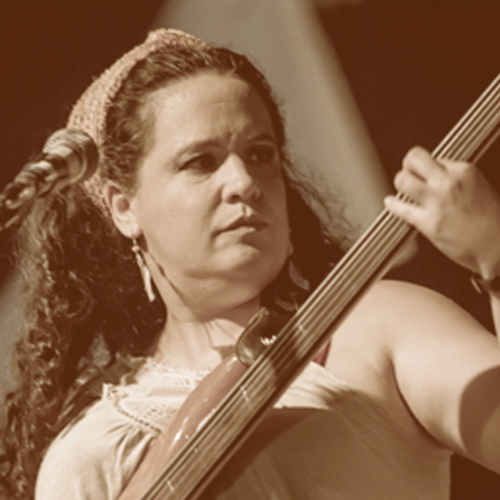
Renata Amaral
Graduated in Composition and Conducting, with a Master’s and Doctor’s degree (in course) in Performance at the São Paulo State University (Unesp), she has performed throughtout Brazil and Europe alongside artist such as A Barca, Ponto Br, Tião Carvalho, Sebastião Biano, Orquestra Popular do Recife, among others. Researcher and double bassist, she has been assembling since 1991 on of the most importante archives do Brazilian popular traditions, having producer over 30 musical albums and 12 documentaries of traditions genres that have been awardew some of thes country’s most importante cultural award, such as Rodrigo Mello Franco Andrade, GUarnicê, Prêmio Claudia, 23º Prêmio da Música Brasileira, and others. She is a two-time winner of Funart’s Interações estéticas award, having carried out artistc residencies in Maranhão and Benin. Author of Pedra da Memória documentarie, with her groups A Barca and Ponto Br, she has recorded 5 albums and taken part in over 500 presentations in projetcs involvin cultural circulation, recording and art-education. She minister courses and workshops focuses on tradition culture in schools and universities.
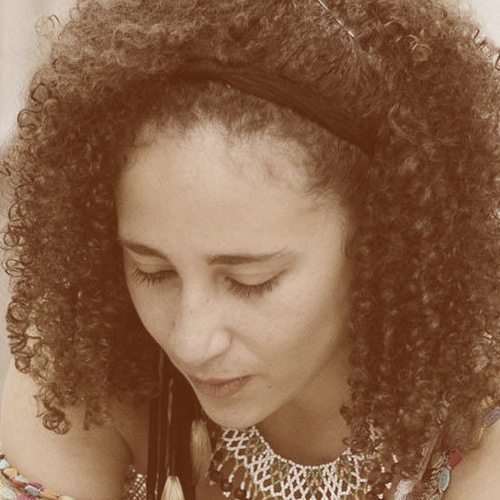
Aline Fernandes
She works in cultural production since 2012. At Maracá, she supervises artistic production and research projects with groups such as Group Dot BR, Memory’s Stone, and A Barca. Besides that, she works independently alongside artists, such as Lia de Itamaracá, Ana Maria Carvalho, and Cupuaçu Group, always having the traditional culture as the main thread of her works. She created and realized the Mostra Elas Em Cena and directed the documentary Mestre Kenura: a roda é universo.
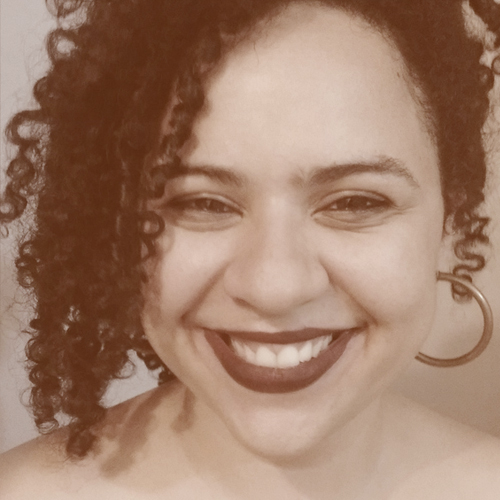
Ana Caroline Bittencourt
She holds a degree in Audiovisual since 2010. It was working at Maracá that she developed her interest in deepening on subjects related to maintenance of memory places, as well as information management. She also works on research and video editing.
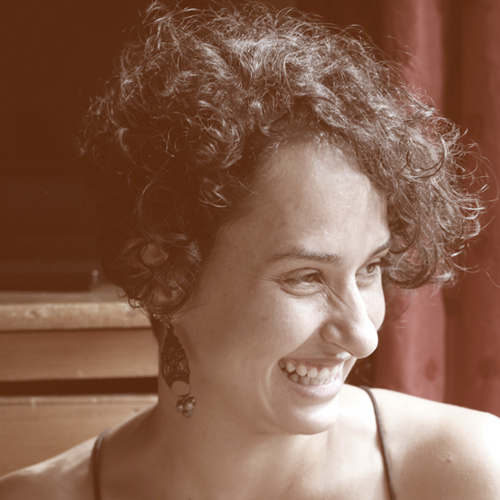
Paula K.
Graphic designer and web developer, she holds a Communication degree, more specifically in Publishing, from ECA-USP and she took a specialization course in Web Application Development at PUC Minas. She is responsible for the development and web design of Acervo Maracá.
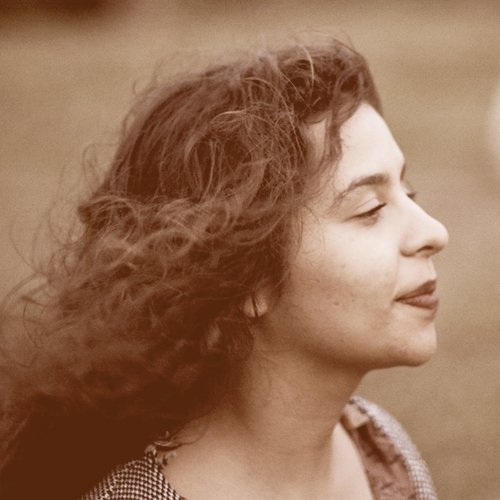
Luiza Fernandes
Her main areas of expertise are audiovisual, music, and popular traditions. Since 2016, she is in the audiovisual field, with some of her works nominated to awards and festivals. She holds a degree in Communications from the University of São Paulo and currently is a Master’s student in Music, Culture and Society at Unicamp, having as main thread of her research the popular festivity Bumba meu boi. She worked at Acervo Maracá, in the digitalization and organization process of audiovisual files, as well as in the film Guriatã. She has also worked in places such as the UN Global Compact, Billboard Brazil, and Verdura Productions. She is one of the creators of the band Berberes and is a brincante (participant of traditional/folkloric festivities) in the Cupuaçu Group of Popular Dances.

Ricardo Souza
He holds a Bachelor’s degree in Social Sciences from USP. He worked as an educator in the Afro Brasil Museum in São Paulo; he worked on projects of safeguarding of the intangible cultural heritage at the Superintendency of IPHAN/SC; he is experienced in research and History education on African and Afro-Brazilian popular culture, production of cultural and educative projects for many groups and artists in the city of São Paulo.

André Magalhães
Music producer, musician, drummer, percussionist, traditional culture researcher, composer, arranger, and audio engineer specialized in acoustic and outdoor recordings. In many functions, he has worked on multiple records, concerts, formation projects, stage direction, films, special projects with artists, groups and musicians from Brazil and abroad, including hundreds of productions with indigenous people, masters, and popular culture groups.
SONIA VASCONCELLOS
Architect, Carioca, brincante (participant of traditional/folkloric festivities), a passionate researcher of our popular traditions, coordinator of multiple study groups, especially related to Coco (popular dance and rhythm from the Northeast of Brazil). Creator of Cocodekentakí, promoting rodas (circles) that animate the streets of Rio de Janeiro in the many varieties of this tradition. Composer and percussionist, she also possesses a precious collection of thousands of vinyl records and rare items, such as recordings from field research made over many Brazilian popular manifestations.
 en_US
en_US pt_BR
pt_BR

